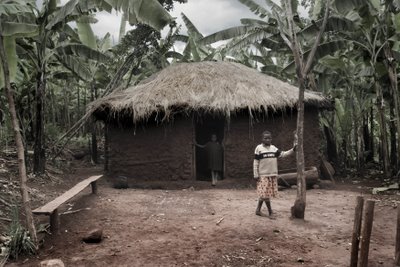Hope
 The tiny girl stops and turns her body to face us; a small sack of cassava flour rests upon her head. Silently she leads us onward over the crest of the mountain to the trail that will return us to our truck. There is more we must see before the rains come—from our mountaintop vantage we observe black storm clouds now not far off—but the grace of this child has captured me and I am content to delay our progress.
The tiny girl stops and turns her body to face us; a small sack of cassava flour rests upon her head. Silently she leads us onward over the crest of the mountain to the trail that will return us to our truck. There is more we must see before the rains come—from our mountaintop vantage we observe black storm clouds now not far off—but the grace of this child has captured me and I am content to delay our progress.
Two hours earlier, Zachée, my Burundian MCC colleague, and I had visited an MCC sponsored tree nursery in the valley far below. The seedlings will soon populate these barren hills, bringing Hope in the form of clean water to the valley’s springs and the peasant farmers dependent upon them. Setting our sights to the top of the mountain to gain an overview of the entire valley basin, we started up against the heat of equatorial noonday sun and my lungs gasped for the oxygen of lower elevations. I observed my surroundings: nothing. There wasn’t anything on this hill. Which is why we were surprised when suddenly, from a ways off, we heard excited shouts. A man was running down the path to welcome us, we could then see, to a gathering of small grass huts near the top. The small man was soon upon us, offering ecstatic welcomes, his hands held in prayer and in greeting. After embracing us, he ushered us towards the rest, who, aroused by his calls, awaited their visitors in a gathering beside the nearest dwelling. They were Batwa, we learned, the much-discriminated pygmy minority. They were eleven isolated families, relocated to the mountain by the government. They were obviously impoverished—one child had infected eyes, many had swollen bellies beneath their tattered clothes—they had not been able to save seeds from the last harvest. The ground was dry, but yet it was the rainy season.
Zachée took down a list of seeds and farming implements that they needed. Apparently a white person had been among them before and had helped them with their growing practices, but they were again in need of help. We would be back soon. Perhaps too, they could join the other workers, planting trees in MCC’s Food-For-Work project. In this way they would benefit not only from the turkey, canned and donated by MCC constituents in North America, but also from direct participation in the restoration of their environment and in the renewed sustainability of their harvests.
The tiny girl’s smile beckons us on. The glimmer in her eyes speaks of hope, but her clothes betray the daily struggle in which she and the others live. I am inspired as I look into the valley below and see the nursery that will provide some of the hope that this girl longs for. In two weeks the planting will begin on the mountain, and we will be back with seeds, hoes, and plans we hope will help these villagers. What an incredible opportunity to be able to be at the end of the long channel of blessings that so many have participated in, and to see the results of so many hearts and hands joined together in service to the poor!


